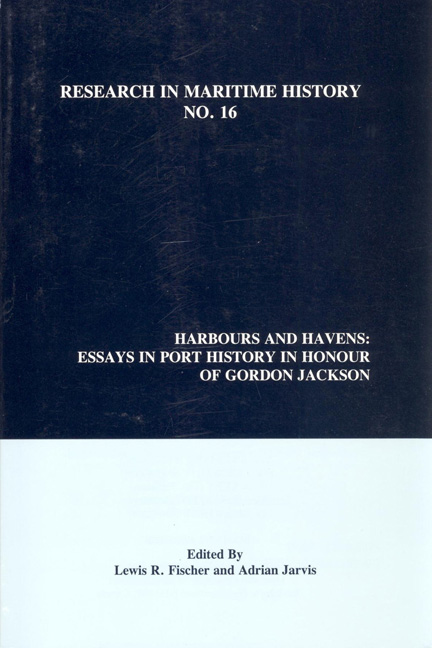Book contents
- Frontmatter
- Contents
- About the Editors
- Contributors
- Introduction
- “Gordon Jackson: An Appreciation”
- “Port History: Some Thoughts on Where it Came from and Where it Might be Going”
- “Port Politics: Interest, Faction and Port Management in Mid-Victorian Liverpool”
- “Our Little Company:' The Wilsons and North Eastern Railway Shipping Company Limited, 1906-1935”
- “The Changing Functions of a Rural Port: Dumfries, 1700-1850”
- “Australian Ports Since 1945”
- “Aspinall, Cornes and Company and the Early Development of the Port of Yokohama”
- “Dubai: From Creek to Global Port City”
- “New York's German Suburb: The Creation of the Port of Bremerhaven, 1827-1918”
- “Capital and Labour in the Port Town of Esbjerg, 1945- 1999”
- “Port Policies: Seaport Planning around the North Atlantic, 1850-1939”
- “Gordon Jackson: A Bibliography”
“Port Politics: Interest, Faction and Port Management in Mid-Victorian Liverpool”
- Frontmatter
- Contents
- About the Editors
- Contributors
- Introduction
- “Gordon Jackson: An Appreciation”
- “Port History: Some Thoughts on Where it Came from and Where it Might be Going”
- “Port Politics: Interest, Faction and Port Management in Mid-Victorian Liverpool”
- “Our Little Company:' The Wilsons and North Eastern Railway Shipping Company Limited, 1906-1935”
- “The Changing Functions of a Rural Port: Dumfries, 1700-1850”
- “Australian Ports Since 1945”
- “Aspinall, Cornes and Company and the Early Development of the Port of Yokohama”
- “Dubai: From Creek to Global Port City”
- “New York's German Suburb: The Creation of the Port of Bremerhaven, 1827-1918”
- “Capital and Labour in the Port Town of Esbjerg, 1945- 1999”
- “Port Policies: Seaport Planning around the North Atlantic, 1850-1939”
- “Gordon Jackson: A Bibliography”
Summary
How can we measure the success or failure of port authorities? In his classic History and Archaeology of Ports, Gordon Jackson pointed to the accommodation of diversity as a key indicator. The specific context of the remark was the mid-century building programme of the Liverpool Dock Trust. Its great achievement in the 1840s and 1850s, Jackson argued, was to create and operate a dock system capable of handling the full spectrum of trades, from bulk timber to luxury spices, carried in a range of vessels from coastal ketches to Cunard liners.
The historian studying Liverpool shortly after this period is bound to wonder what went wrong. Evidence from the early years of the new Mersey Docks and Harbour Board (MD&HB, founded in 1858) reveals a port struggling to balance the interests of competing factions and slipping into inertia and poor management. The local press adopted a weary tone when reporting Board meetings, like the one in 1863 during which “a long and exceedingly desultory discussion took place relative to providing accommodation for the steam trade, but nothing of the slightest public interest was elicited.” Later commentators have been equally critical. Recalling the Board's activities in his youth, William Forwood claimed that the 1870s were marked by bitter disputes between different trades for representation and widespread manipulation of the election process. The Board's own historian pointed to the mid-century era as a rough patch, although he argued that the controversies helped to mould the organisation into a more effective body, with its mind set “not on sectional interests but on the commerce and trade of the whole Port.“
Of course, historians have reason to be suspicious of some of this evidence. Men like Forwood had every interest in highlighting early failures because they claimed credit for reforming the work of the Board later in the century. When Forwood wrote early in the twentieth century that “there is no branch of the public service of which Liverpool people are more proud,” his case was helped by the contrast he drew with the earlier era.
Nonetheless, more recent scholars have also identified divisions and factionalism as real and dangerous issues in the management of the port.
- Type
- Chapter
- Information
- Harbours and HavensEssays In Port History In Honour Of Gordon Jackson, pp. 35 - 62Publisher: Liverpool University PressPrint publication year: 1998



